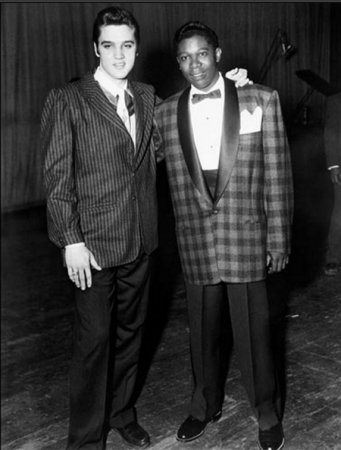Homage to Black American Music Tradition: Part of the Secret to Elvis’ Success
| By AMIR SAID (SA’ID) |
 For the better part of the last 15 years, I’ve encountered people who either adore Elvis or hate him. This has always struck me as an odd scheme of understanding. I mean, how and why can one individual cause so much polarization? Of course, you never hear anyone say (publicly at least) that they hate The Beatles. And at last count, Michael Jackson’s album, Thriller, still seems to draw favorable consensus. So what is it about Elvis that causes such disdain, especially among purveyors of hip hop/rap music?
For the better part of the last 15 years, I’ve encountered people who either adore Elvis or hate him. This has always struck me as an odd scheme of understanding. I mean, how and why can one individual cause so much polarization? Of course, you never hear anyone say (publicly at least) that they hate The Beatles. And at last count, Michael Jackson’s album, Thriller, still seems to draw favorable consensus. So what is it about Elvis that causes such disdain, especially among purveyors of hip hop/rap music?
Maybe it’s because Chuck D declared him a racist two decades ago; remember the Public Enemy song “Fight the Power,” where he Chuck D rhymes: “Elvis was a hero to most/But he never meant shit to me you see Straight up racist that sucker was
Simple and plain…” Or perhaps the disdain for Elvis by some in hip hop/rap stems from the misperception of Elvis as some sort of “culture vulture,” who stole his sound from black American musicians in the Mississippi Delta. Wrong! That’s a bogus argument even on the face of it. Less one forgets (or doesn’t know), Elvis is from the Mississippi Delta. Therefore, he has as much a native claim to any and all musical developments that occurred there as anyone else who was born and raised in the region. Moreover, it’s been widely reported that the teenage Elvis spent considerable amounts of time taking in the blues scene of Memphis’ Beale Street. Add to that the fact that he grew up listening to the regional radio stations like Memphis’ WDIA, the nation’s first radio station to feature an all-black format and on-air staff (1949). (Stations like WDIA played what was then known as “race records.”) So by all serious accounts, it’s rather obvious what Elvis’ early musical influences were: blues, gospel, rhythm and blues, and rockabilly—all components of the Black American music tradition. Moreover, these early musical influences from the Black American Music Tradition were largely a part of Elvis’ success.
Thus, when hip hop/rap aficionados (or any other groups) reject Elvis, they are actually rejecting a musical icon who earned his stripes through the serious study of the musical tradition that laid the foundation for all American popular music in the twentieth century. Moreover, those who reject Elvis’s musical validity, also, in effect, turn their backs on the musical scholarship that he provides. For less we forget: Every musical artist is a gateway to others…and the more critically acclaimed the artist is, the more enriched the gateway is.
By listening to and studying Elvis, I was prompted to listen to and study Big Joe Turner, the iconic bluesman who helped create the template for rock and roll (rock n’ roll). Perhaps I would have studied Big Joe Turner even if I didn’t take a more serious look at Elvis. But listening to Elvis’ earlier work prompted me to A/B his style with Big Joe Turner. MusicStudy of this nature has been and is incredibly important to understanding of all music, not just hip hop/rap music.
Certainly Elvis doesn’t need any marketing help; you don’t get much higher than him in the scheme of American pop culture. And there’s certainly not doubt that his career benefited tremendously from the fact that he was white; many of the Black artists that influenced him could never access the platform that he was afforded. But Elvis, who I at one time refused to listen to (for whatever reasons), does represent the complexity and beauty of how music traditions and cultures can, at times, transcend negative racial attitudes. But all of this aside, ‘What can his music teach or do for me,’ I once asked myself. Well, it taught me a lot and it did more for me than I could have imagined. Ironically, or perhaps not, through an honest study of Elvis, I discovered Sister Rosetta Tharpe; became more interested in Big Joe Turner and B.B. King; and I meticulously traced the business roots of rock n’ roll.
Bottom line:
If you’re going to contribute to any music tradition or culture, if you’re going to go after a career in music, the more musical understanding that you can draw from, the more enriched your music will be, and, subsequently, the better your chances at having a career in music.
The music and videos below are presented here for the purpose of scholarship.
Elvis Presley – “Shake, Rattle and Roll” (Elvis’ first televised appearance.)
Note. “Shake, Rattle and Roll” was originally recorded by the bluesman, Big Joe Turner.
Big Joe Turner – “Shake, Rattle and Roll”
The original recording of “Shake, Rattle and Roll.”
Elvis Presley – “Heartbreak Hotel”
The song below is unmistakably blues.
Sister Rosetta Tharpe – “Didn’t Rain”
Sister Rosetta Tharpe had a seminal influence on Elvis.
Elvis Presley – “A Little Less Conversation”
Although it’s from Elvis’ later catalog, it’s my favorite Elvis recording. If you know Mack Davis (singer-songwriter), you can hear him in the lyrics. Also, peep the drumwork at the intro of the song!
